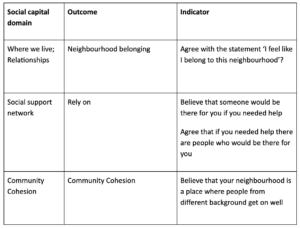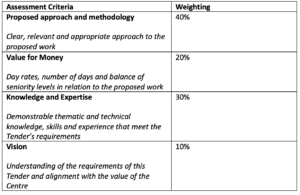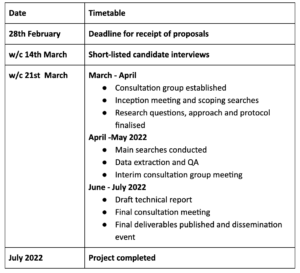Invitation to Tender: Rapid review of intervention research that evaluates social capital outcomes
Note that the deadline for this ITT has passed.
We are looking for a senior researcher or research team with experience of conducting evidence reviews and with familiarity of wellbeing concepts, social capital and research.
The What Works Centre for Wellbeing is pulling together all the research findings from interventions aimed at improving:
- Neighbourhood belonging
- Social network support
- Community cohesion
So that we can discover what works to improve key social capital outcomes.
What are we looking to do?
We’re looking for a person/team to work with us to review the evaluation evidence on bridging and bonding social capital specifically:
- What evaluation research has been carried out to assess the effects of wellbeing programmes and interventions on neighbourhood belonging, the strength of social support networks and community cohesion?
- What is the strength of evidence of the evaluation research?
- What are the key findings from the research?
The researcher/research team would use a rapid review methodology to identify studies that use the following social capital outcome variables:

Studies are likely to be interventions that:
- Affect how we are doing collectively as communities.
- Are aimed at improving the quality of our relationships in a place.
- Look at the spaces that enhance our social connectedness and reduce wellbeing inequality.
The review aims to:
- Provide a summary picture of the evaluation literature that focuses on interventions aimed at improving one or more of the following outcomes: neighbourhood belonging, social network support and community cohesion.
- Identify gaps to inform further research.
- Promote the availability and use of evidence from select social capital indicators to inform recommendations on what works and for whom, including the role of contextual factors.
Given the multidimensional nature of social capital and the lack of a summary measure for the concept, we expect the review to have highly focused parameters to ensure a degree of comparability and consistency among the collated studies (Patel, 2016; (Frijters & Krekel, 2021)).
About the role
The appointed researcher/team will be responsible for:
- Conducting scoping searches and making recommendations on how to maximise relevant returns.
- Conducting main searches.
- Extracting key data from the studies.
- Conducting critical appraisal of the included studies using our Centre’s predetermined quality criteria.
- Developing an approach for summarising and/or synthesising the findings by intervention thematic area,type, or social capital outcome.
The What Works Centre for Wellbeing will be responsible for project management and methodology, as well as the leading on the following specific aspects of the work:
- Producing a final scoping report to inform the development of the search strategy and protocol.
- Approving the final search strategy, including basic parameters for study identification and inclusion criteria.
- Chairing the project consultation group.
- Conducting final quality assurance to assess robustness, usefulness and accessibility of study findings.
We will set up a project consultation group which will include our Executive Director and will be composed of academics and practitioners to act as a ‘sounding board’ on methodological issues. The group will ensure that findings are analysed and disseminated in a way that is clear, relevant and useful for our Centre’s key audiences.
Deliverables
We would like the researcher / research team to produce a technical report which should include:
- Project PICOS and PRISMA diagram
- Details of included studies using our Centre’s study data extraction template and critical appraisal framework
- A brief summary that addresses the following questions:
- State of the Evidence: How developed is the evaluation evidence base on bridging and bonding social capital outcomes? What evidence is there for causal inference by each social capital outcome?
- Evidence Gaps: Where are the gaps in existing knowledge, including uncertainties for specific intervention thematic area or type?
- Applicability: What are the implications of this research for the design of future interventions aimed at improving neighbourhood relationships, social network support and community cohesion?
- Recommendations: How can the What Works Centre for Wellbeing build on this work in the future?
How to apply
If you would like to be considered to undertake the review please detail your expression of interest and a short research proposal in no more than 2000 words (excluding tables and references) to cover:
- Your understanding of the brief and proposed methodology for refining the thematic scope, breadth and depth of the review.
- An outline of the search strategy you intended to use and how you will access this data (in light of potential covid-19 restrictions for accessing data secure labs etc).
- Your ability to carry out the proposed work, including relevant skills and demonstrable thematic and technical expertise.
- A Project Plan with key activities and deliverables, including number of days expected for each task.
- A Budget, including a full breakdown of your proposed fees, identifying the day rate and seniority of member(s) of staff assigned to each role. The proposed budget should include all expenses and VAT, where applicable.
- An example (and link, if possible) of two pieces of related work carried out that demonstrates your ability to deliver similar assignments.
Please send your proposal with the subject line: Proposal for SOCIAL CAPITAL Rapid Review to evaluation@whatworkswellbeing.org no later than 5pm on 28th February 2022.
Assessment Criteria
Our criteria for assessing the applications includes quality and price and is set out below:

Please submit any questions by email to evaluation@whatworkswellbeing.org with the subject line: Question regarding the Social Capital ITT.
Expected Timetable

Background information
What is social capital?
As a Centre, we are interested in the collective wellbeing of communities and societies and our reviews have identified a diverse range of activities and intervention types associated with community wellbeing improvements, ranging from: heritage, housing, outdoor recreation to volunteering and sports.
In the literature on community wellbeing, the concept of social capital focuses on key social and place-based outcomes, encompassing different types of social relationships and associations that affect individual and community wellbeing.
These have commonly been classified according to a theoretical distinction between bonding and bridging social capital:
- Bonding social capital – social networks characterised by relationships within groups, such as friendships or familial relations, that are relatively homogenous and inward-looking;
- Bridging social capital – social networks characterised by associations between groups, such as colleagues or neighbours, that are more commonly outward-looking social networks (ONS, 2019).
Measuring social capital in the UK
Bridging and bonding outcomes are central to the UK government’s definition of social capital as “the extent and nature of our connections with others and the collective attitudes and behaviours between people that support a well-functioning, close-knit society.”
Since 2012, the Office for National Statistics (ONS) has been collecting Social Capital data using 25 indicators that span four domains:
- Personal relationships
- Social network support
- Civic engagement
- Trust and cooperative norms.
The recent publication of a harmonised indicator set in July 2021 offers an opportunity to track place-based goals and improvements at the local, regional and national levels.
Additionally, as communities deal with the long-lasting effects of the pandemic and become more diverse in terms of ethnicity and place of birth of residents, social capital domains encompass increasingly important goals within the levelling-up agenda.
Evaluation deep dive
The Centre conducted some scoping work with funders and civil society stakeholders in 2018 to survey the sector’s needs and current practice in regard to wellbeing evaluation. Findings suggested that the sector is generating a diverse body of wellbeing evidence and that there is an opportunity to inform the design of wellbeing programmes and pilots by giving higher quality evaluations greater visibility.
Since 2019, we have used more pragmatic review methods to conduct targeted searches for wellbeing evidence. To date, we have carried out rapid evidence assessments to build a summary picture of the evidence on personal wellbeing outcomes (ONS4) and to explore the link between subjective wellbeing and volunteering. These findings form part of our knowledge bank which now includes over 500 evaluations of wellbeing programmes and interventions delivered across 29 OECD countries.
In early 2022, we will publish findings from our Rapid Review of evaluation research that reports findings on “what works” to improve mental wellbeing using the Warwick-Edinburgh Mental Wellbeing scales (WEMWBS).
